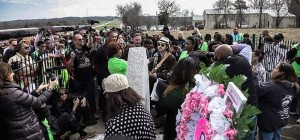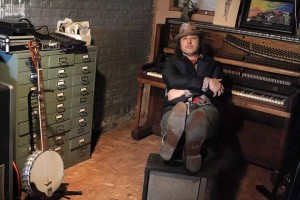SPOTLIGHT: My Conversation with Troubadour, Singer, Songwriter Arlan Feiles after his trip to Selma, Alabama for the 50th Anniversary Jubilee of March from Selma to Montgomery and a Tribute to Viola Liuzzo bY Calvin Schwartz May 3rd 2015
Life can be like a synchronistic loose thick thread. Tethered to a pole, it blows in the wind and if you can plot its movement, there might be a message spelled out. Three years ago, who knew I’d become friends with Arlan Feiles. Two summers ago, before the winds of winter arrived, we shot hoops together in each of our backyards and managed to see Kobe and the Lakers play the Brooklyn Nets. Three years ago, Scott Fadynich, a mutual friend, perseverated that I had to hear Arlan Feiles sing. So I did finally at The Saint in Asbury Park. My reaction was instant and lasting; Arlan is an extraordinarily sensitive, introspective, hugely talented singer songwriter with an unusual (for today’s world) social conscience which emanates, permeates and saturates his soulful songs. I came out of the sixties where troubadours like Dylan, Phil Ochs, Pete Seeger, Richie Havens, Joan Baez, Judy Collins and Tom Paxton flourished. With Arlan, I felt back home again in the future.
Arlan asked if I wanted to go to Selma for the Jubilee. The timing wasn’t right but I should’ve been there. Perhaps the next best thing was to sit down with Arlan in his kitchen for two hours after he got back. He was invited by the family of Viola Liuzzo to sing the song he wrote seven years ago, ‘Viola’ at the service at a chapel near her memorial on Route 80 in Selma. It’s best if you check this link out on Viola Liuzzo’s life: (http://en.wikipedia.org/wiki/Viola_Liuzzo ) Yes, Viola Liuzzo was a housewife in Detroit in 1965, a mother of five and a civil rights activist who went down to Selma to help. She was murdered by the Klan (an FBI informant was in the car that pulled her over) There is still much to the story of courageous Viola that has yet been told. Arlan heard about Viola, the only white woman murdered in the civil rights movement. He was so moved by her life and death, that he wrote the song ‘Viola’ and became part of the Liuzzo family. More on that later. Also, here is Arlan singing ‘Viola’ on You Tube. https://www.youtube.com/watch?v=rPpihyVY0JE
His kitchen was comfortable; the family dog rested on my left shoe under the table. This interview is streams of consciousness and in the exact order of revelation. I asked about what I read about Viola and the FBI. “Viola got it from both directions. Hoover hated Dr. King and Jimmy Hoffa even more.” Viola’s husband was an executive with the Teamsters in Detroit. Arlan jumped to the flight home. “I flew home with Lucy Baines Johnson and Congresswoman Debbie Wasserman Schultz. We talked about Viola. I gave them both CDs and told them why I was there.”
I mentioned to Arlan about the synchronicity of the night before when I was at a new gig as co-host of Danny Coleman’s Rock on Radio Show. Walking around the 40 Foot Hole Studio, which was really part of the living quarters of the Murray Grove Retreat Center and Universalist Unitarian Church, I saw a poster of a hundred Church members who made a difference including pictures of Albert Schweitzer, Charles Darwin and Dickens, Clara Barton and Pete Seeger. There was Viola’s picture; I was seeing Arlan in the morning. “She was very ahead of her time; One of the first white women to join the NAACP.”
“I want to let people know that it’s important Viola’s story be told. Viola is not given her equal due in the civil rights community; A fair plain statement. However the movie, ‘Selma’ has brought a lot of new people to her story. There was a constant flow of people to her marker. It’s half way between Selma and Montgomery exactly where she was driven off the road and murdered. There’s a small church at the roadside where I played the piano. I also stopped at both the Hank Williams Museum across the street from the Rosa Parks Museum.”
I asked Arlan about the current state of information about Viola’s murder. “It’s frustrating that her story isn’t fully realized. The more people that become aware of Viola and what she stood for and what she died for; there will be more hunger to hear the rest of that story.”
They flew into Atlanta on the Friday night and drove to Montgomery where they lodged. “A lot of Italians were there. They were interested in the Liuzzo’s. A few young Italian girls were making a documentary about Viola and another one was from the Italian press.” “I wrote the song ’50 miles’ because of the March from Selma to Montgomery.”
“What about Sunday in Selma?” “So many people came into Selma, they were held at the bridge. (Edmund Pettus Bridge) The politicians left on Saturday which was kind of bogus. Sunday was for the real people. A lot of dignitaries, organizers, I think Martin Luther King’s daughter, after the service, were supposed to go over the bridge. There were so many people, they couldn’t agitate them, and so they let some people cross. Well, they soon found out, once you crossed the bridge out of Selma, you could not come back in because the National Guard closed Selma because of the huge numbers of people. Once you cross, you can’t come back. Next thing you know everyone stops on bridge. Many groups did cross and buses picked them up.”
I asked if Arlan and the Liuzzo family crossed. “No we didn’t. People were trying to turn around. Police couldn’t insure the safety of the dignitaries, so they cancelled them; wouldn’t let them cross. Many did get over. I saw one group with a banner go maybe 15 feet in 45 minutes. There were some protestors who said when you get to the other side of the bridge; there will no longer be systemic racism. We know racism is still here. But to celebrate the advancement has merit.”
On Saturday night they screened the documentary ‘Home of the Brave’ about Viola Liuzzo. Paola di Florio, the director did the screening. Arlan performed after the Q & A. “Viola is buried in Detroit. The Teamsters took care of getting her back to Detroit.” “When did you write the song ’50 Miles’?” “I was talking to Mary Liuzzo when she invited me to come down. She said you should write a song for the 50th Anniversary. A few weeks ago I recorded it before I left. It took a few hours to write for the most part.”
We talked next about the memorial for Viola. “The memorial has been vandalized many times.” I reminded Arlan about the man (Edmund Pettus) for whom the bridge is named. We both laughed sardonically. Mr. Pettus was a U.S. Senator from Alabama and Grand Dragon of the Alabama Ku Klux Klan. “The Mayor of Selma did appoint a KKK Dragon to be a member of his council. During the March, the KKK went around house to house with flyers to get people to join and they bought a billboard to promote seeing the Civil War sights.” The billboard is dedicated to KKK founder Nathan Bedford Forrest and contains the quote, “Keep the skeer on ’em.” It features a Confederate flag. I thought to myself about why I’ve never been down south and decided to leave it that way beginning right after I saw ‘Easy Rider’ in 1969. Am I just a damn Yankee?
There was a lull in the conversation after our Klan talk. We both sensed introspection. Then Arlan continued. “My effort is to get more people to hear her name; to have role models like that for white people to know they can be involved. She died for injustice to people. Viola really believed we are our brother’s keepers. She didn’t see blacks being oppressed; she saw people. She answered that call. If all of us had that ideal ingrained, the world would be a better place. It seems like an easy solution.”
Arlan was back to Saturday. “We had breakfast with Sally and Penny (Viola’s daughters). We met at the Cracker Barrel. I guess I was really down south; had to have biscuits and gravy with grits. I’m going to my cardiologist tomorrow. Sally gets a text from Mary. “We walked out of the Mayor’s dinner last night.” It’s public knowledge. They (the family) were snubbed. There are a lot of times like that. Once in Shreveport; they were there to get an award for Viola. The following morning they go to check out of the hotel. Everyone is gone and left them (the family) with the bill. They were crying. “
More from the breakfast; “Learned FBI approached Penny and Sally. It’s not a secret. They wanted to talk to them. They felt exploited. There was an FBI informant in car which pulled Viola over and killed her. The family sued the Federal Government for years and years but they lost. FBI informant never went to jail.” Arlan took a deep pensive breath. I waited. “The story is not finished. They are living it. Still a work in progress; they can’t make a movie yet. Viola’s story is a cold case as far as family and advocates concerned.”
“After breakfast, Dan (who documented Arlan’s trip) and I went on an exploratory journey to Montgomery; museums, downtown, Rosa Park Museum, Hank Williams Library. Downtown is almost a ghost-town although it was a weekend. A KIA plant is there with a large Asian population so Sushi is available.”
“Later three buses of Teamsters pulled up; 150 or so. They came out to honor Viola and family and escorted them from the chapel to the marker. Teamsters chanted all the way which the girls participated in. They’re proud to be a Teamster family. Most of the Teamsters were black. A young black women’s group did a reading honoring Viola at the Wright Chapel where I played the piano and sang. 150 people were at the memorial but no politicians. I sent Congressman (NJ) Frank Pallone a note. I’m a constituent in his district. He was in Selma. His presence would’ve been appreciated. No response of course.”
I wondered about President Obama and his knowledge of Viola. “The President has mentioned Viola’s name several times. The whole weekend worked out beautifully for politicians and rock stars on the big stage. The Liuzzo’s keep getting knocked down, half respect, left with the check, yet they pick themselves up and continue to do Viola’s work.”
Arlan’s oldest pre-school daughter, Tessa, walked into the kitchen. I marveled at her animated wondrous face and expressiveness. She was hungry. Her timing was perfect too. We were in a heavy modality and needed relief. Tessa took my pen and created precious art on my yellow legal pad. Arlan plunged back into consciousness. “When Viola’s body came back to Detroit, people threw bricks and shot guns into their house. They were called racial epithets. The family has endured a lifetime of abuse and spent years in courts trying to clear their mothers name. It all started with Hoover (FBI) and it’s documented. Even her autopsy was altered to include needle marks in her arm. They said on the news she was a drug addict.” I asked Arlan if it was to discredit her. “Yes. And even an article blamed her for leaving her family. Still fighting to get the recognition she deserves.”
Logically, I next asked Arlan how he got involved with the Liuzzo family. “Three years ago, during Light of Day, I performed ‘Viola’ at The Watermark. A woman from the Asbury Park Press was interested in the story and wrote about my performing the song and included lyrics and talked about Viola Liuzzo, Civil Rights Martyr. The article came out on Martin Luther King Day. Sally Liuzzo had her Google alerts set for Viola Liuzzo in national press. Google alert said Arlan Feiles performs song, ‘Viola.’ “Who is this guy? I have to hear this song.” She hunts me down and is so overwhelmed, she wrote me a beautiful long letter via Facebook, thanking me. It was followed by two more letters by Mary and Penny with an invitation to join them in Shreveport for Viola Liuzzo Day.”
Tessa was still hungry. I knew it was time. It had been two fascinating intense hours. And I got to know someone just a little bit better. I visualized that string blowing in the wind. And today is May 1st. There beyond my computer screen is a May Pole. Children are laughing, playing and dancing. The blowing string is spelling out the words, “A caring special soul.”Arlan Feiles.
Please check out: http://www.arlanfeilesmusic.com

 Follow
Follow















